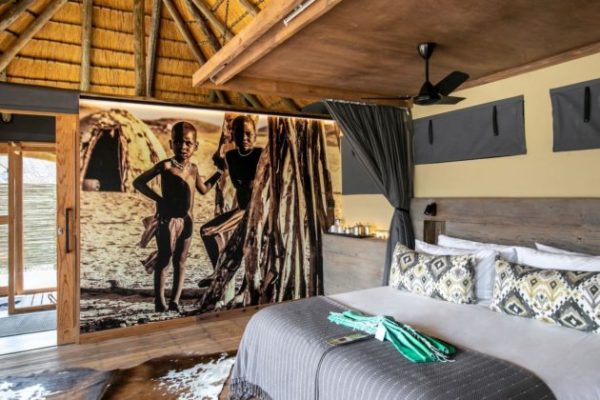Wilderness Safaris, a leading eco-safari company and environmental organization in southern Africa, has opened the doors of its Serra Cafema camp in the most northwestern region of Namibia after the construction of a new building more respectful of the environment.
The camp is part of a joint venture and has been designed with respect for the culture and traditions of the Himba people. Serra Cafema, thanks to its location in one of the most remote areas of southern Africa, on an island located on the banks of the Kunene River in the Hartmann Valley, allows guests to experience unique experiences in a desert region exceptional.
Serra Cafema is part of a joint venture between Wilderness Safaris and the 300,000-acre Marienfluss Conservancy, which is primarily owned by one of the world’s last semi-nomadic tribes, the Himba.
The camp has a deeper purpose. “In addition to luxurious accommodations and regional hospitality, the goal is to explore and preserve the vast and wild Kunene region, to better understand the ancient and vibrant culture of the Himba and to protect it. This allows Serra Cafema’s customers to connect to themselves and the Earth. This is precisely what defines the luxury of space and solitude as well as the value of unique experiences, “said Alexandra Margull, Executive Director of Wilderness Safaris Namibia.
Close connection with Himba culture
The relationship with nature and the surrounding culture has played an important role in the history of Serra Cafema since its beginnings and has gradually intensified over the years. The current camp follows new standards: true to the sustainable concept of Wilderness Safaris, Serra Cafema is environmentally friendly and designed in honor of the Himba culture. The structure of the main area is reminiscent of a Himba village. All of the camp buildings are interconnected by different outdoor spaces, creating private retreats. Existing trees have been preserved thanks to a special arrangement and are used to shade naturally.
Windhoek architect Karen Munting of Munting Rechholtz Architects is responsible for the architecture of the new Serra Cafema, while interior designer Liezl Louw of Beyond Design is responsible for the interior design of the camp.
View of a river in the middle of the desert
The eight spacious and luxurious rooms overlook the Kunene River and the Angolan mountains in the distance. They feature a lowered seating area, an extra bed and indoor and outdoor showers. A large private terrace in each room reveals the surreal image of a river in the middle of the desert, creating moments of breathtaking private dining.
The main area also overlooks the river and has a seating area ideal for stargazing. Natural materials throughout the camp reflect the environment and adjacent trench stones have been incorporated into the walls and structures. The design is comfortable, modern, combines new elements while retaining the soul of the old camp Serra Cafema.
Support local businesses and workers
Camp details come from local businesses and illustrate the commitment to support regional providers. The tables in the dining room were built by young artisans from TABLED, a social enterprise that integrates orphans in furniture construction and offers them a future. The harmony with the Himba culture is reflected in every detail: the leather on the menus menu, wines and rooms reminds the wearing of leather Himba tradition. The cards are made in a Windhoek-based company that creates training and creates jobs for unskilled local workers. The exclusive bathroom line for Serra Cafema comes from the local Mbiri company. And in collaboration with Himba women, Mbiri has developed a range of
products based on the tradition of sustainable harvest of grapes from the Omumbiri tree and its use as a fragrance. Materials left after camp construction were donated to the Marienflussconservancy to support local schools.
Sustainability and conservation of nature as an objective
Serra Cafemas focuses on the ongoing protection of biodiversity in this region of origin and on the positive influence on the members of Marienfluss Conservancy. Serra Cafema is 100% solar powered and is in line with Wilderness Safaris’ commitment to reduce its environmental footprint. On the other hand, Wilderness Safaris has set itself the goal of restoring the island on which Serra Cafema sits and planting endemic tree species.



